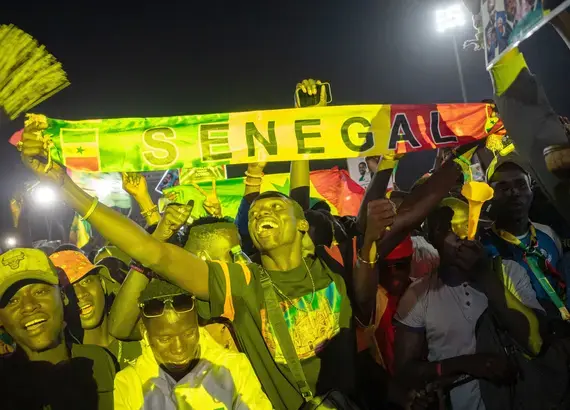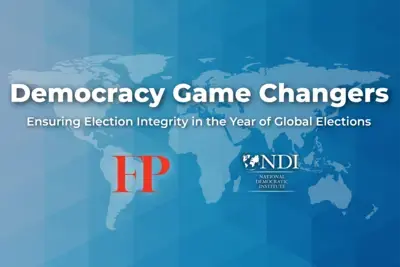
Success Story
After a Senegalese Constitutional Crisis, Civil Society Leads the Way
After a highly contentious and contested electoral process, the March 24, 2024 presidential election restored confidence in the resilience of Senegal’s democracy. For the first time in the country’s history, there were no legal disputes following the election, and the transition process moved swiftly to enable a timely and effective transfer of presidential power on April 2. With Bassirou Diomaye Faye coming into power as Senegal’s youngest ever president after centering his campaign on promises to expand opportunities for young people, and reform political and economic structures, Senegal has shown that generational change can come through the ballot box. The work of Senegalese civil society and all contestants’ acceptance of the results are inspiring to those working for democratic change across the continent.
The road to the 2024 election was long and difficult – with last-minute delays that were overruled by the supreme electoral court, the Constitutional Council – but constitutional rule and democratic norms were protected and bolstered by active engagement among civil society, political actors, and citizens. In late 2021, NDI and its partner the Collective of Civil Society Organizations for Elections (Collectif des Organisations de la Société Civile pour les Elections - COSCE) began the “Nietti Elections” (Three Elections) program supported by USAID via CEPPS. The program facilitated civil society engagement in election observation, civic and voter education, and political dialogue. COSCE is a longstanding coalition of a dozen civil society organizations that has systematically observed electoral processes since 2012. Over the course of three elections - starting with local and legislative elections in 2022 and then the 2024 presidential election - COSCE evolved its election observation methods and deepened its nationwide network of observers. Starting with local elections in 2022, COSCE activated a network of long-term observers in each of Senegal’s 46 county-sized departments. These observers monitored the pre-election process leading up to the presidential polls. The lengthy pre-election observation allowed COSCE to conduct a deeper analysis of key early phases, including voter registration, ballot qualification, and political dialogue processes.
During periods of major tension, including controversies over candidate eligibility and changes to the election timeline, NDI was actively engaged in supporting political dialogue. Since March 2022, NDI has assisted a civil society “ad hoc facilitation committee,” which has played a key role in mediating election-related controversies. In early 2023, when the trial of opposition leader Ousmane Sonko sparked clashes between demonstrators and police, NDI worked alongside its partners COSCE and AfrikaJom Center as neutral facilitators to maintain channels for dialogue between the opposing sides. NDI and its civil society partners also engaged religious leaders who proceeded to call on political actors to continue dialogue and act to maintain stability and peace. In May 2023, the program facilitated a meeting of the ad hoc committee with the Caliph-General of the Mourides, leader of a religious order who is widely respected by Senegalese across party lines. His subsequent encouragement in favor of peace and dialogue with political leaders significantly contributed to easing tensions.
NDI’s support for dialogue and civil society coordination on election matters proved invaluable when President Sall indefinitely postponed the presidential election on the eve of the campaign period. Leveraging the networks and coordination framework established with NDI’s help, COSCE leadership rallied a broad coalition of civil society that included unions, academics, social movements, religious leaders, election observers, and other civil society organizations under the umbrella Aar Sunu Elections (Protect Our Elections), to push back against the unconstitutional move. In the face of excessive violence against protestors that resulted in the loss of life for four young Senegalese citizens, Aar Sunu Elections gave voice to the deep unpopularity of the election postponement and attracted international attention to Senegal’s constitutional crisis. Civil society’s action empowered Senegal’s constitutional council, which ruled that an election had to be held prior to the end of Sall’s term on April 2. The election was then called with less than three weeks' notice, requiring a compressed campaign period. Civil society united in favor of continuing the electoral process turned out to be a critical ingredient for Senegal to hold its presidential election in a constitutional timeframe with a high turnout.
Once the election date was finally settled, a network of voter education and awareness-raising organizations supported by NDI jumped into action to facilitate a wide range of creative voter education activities encouraging voters to collect their voter cards, which are required to vote. Radio and television spots and infographics circulated on social media along with in-person events helped to increase the rate of voter card distribution from 51% to 56% nationally in the final days of the campaign. During the week before the election NDI partners in all ten regions of the country conducted activities specifically to encourage women and young people to collect their voter cards. Youth-led organizations in Saint-Louis held five events explaining the mechanics of voting on election day and urging youth to collect their cards. Volunteers in Tambacounda from the Senegalese Women’s Council (COSEF) similarly prompted women to get their cards. Discussion forums in the towns of Kaolack, Guinguineo, Koutal, Ndofane and Nioro raised awareness of the election process and measures for keeping it peaceful. In the town of Ziguinchor, partners distributed flyers in the markets that explained and illustrated how to vote. Similar information and messages were delivered by NDI partners through the Senegal Vote app, in discussions featuring popular rappers, and by young people painting murals that read: VOTE!
COSCE relied on its extensive local networks developed over the course of successive elections and aided by NDI experts to recruit, train, and deploy 1000 election observers, including 500 who deployed to a statistically representative sample of polling stations, in under one week. On election day, all 1000 deployed, allowing for near-real time data collection and analysis on the quality of election day processes, voter turnout and election results. COSCE’s systematic election day observation and analysis informed evidence-based public communications that bolstered trust in the quality of the election day process. COSCE was also able to share findings on voter turnout and the fact that there would not be a second round privately with key stakeholders on election night, and publicly the next day, which facilitated rapid acceptance of the results.
The high turnout contributed to an unexpected first-round win for the main opposition candidate, a young first-time contender for the presidency. COSCE’s documentation of the peaceful and professional conduct of polls on election day reinforced Senegalese citizens’ faith in the quality of the country’s election day process. Meanwhile, the timely completion of an election featuring strong turnout despite the questions and challenges that preceded it, showcases how democratic processes and institutions give countries like Senegal a means for self-correction during a crisis.
When the previous Senegalese government announced it would delay the country’s elections, citizens and observers around the world wondered if Senegal’s democracy could persist through this crisis. However, relying on years of institution-building and grassroots organizing, civil society mobilized to put pressure on those in power to hold elections, ensure that those elections were secure, transparent and credible, and ultimately shepherd in a peaceful transfer of power. In response to civil society’s tremendous efforts in the lead up to election day, not only did the election run relatively smoothly, but voters turned out in high numbers and confirmed the importance of the democratic process. Building on this triumph of democratic institutions and civil society, NDI’s partners in Senegal are prepared to take on the challenge of holding this new government accountable for its campaign promises, including commitments to making Senegal’s electoral process more inclusive, transparent and accountable.
NDI's engagement with this program is implemented with support from the United States Agency for International Development (USAID) through the Consortium for Elections and Political Process Strengthening (CEPPS).

